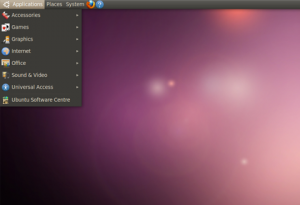 An update to Ubuntu, one of the most popular distribution of Linux, was released on April 29, 2010. The 10.04 update, codenamed Lucid Lynx, touts features like a new music store, online synchronization, stability improvements, and a new standard theme.
An update to Ubuntu, one of the most popular distribution of Linux, was released on April 29, 2010. The 10.04 update, codenamed Lucid Lynx, touts features like a new music store, online synchronization, stability improvements, and a new standard theme.
Ubuntu is a free operating system; its users are able to modify the software as they wish and it costs nothing to download or use. These ideals parallel the philosophy behind Linux.
To test the software, I downloaded a CD image of Ubuntu from the distribution’s website. After booting up my computer, a new theme greeted me. Instead of Ubuntu’s historically brown and orange color scheme, I saw sleeker, black menus with purple and orange highlights. This mirrors the trend by companies like Microsoft to favor business-like, streamlined themes. Mark Shuttleworth, founder of the Ubuntu project, acknowledged the need for Ubuntu to compete with advanced user interfaces from the likes of Apple and Microsoft.
Installing Ubuntu 10.04 is easier than ever, thanks to an improved graphical installer. On my Macbook, I decided to dual-boot and created two hard drive partitions.
Linux has a reputation for being difficult to install, but Ubuntu has made it easier. Despite the relative ease, hardware providers that do not provide open source drivers often mar a fresh Ubuntu installation. My Macbook did not support external monitors and my bluetooth keyboard out-of-the-box. After some tinkering, however, Ubuntu ran perfectly.
For most users without these issues, the graphical installation is a quick, easy way to start using Ubuntu. Installing Ubuntu took 20 minutes.
For years, Ubuntu offered free software alternatives to programs like the Microsoft Office suite. F-Spot, a photo organization and manipulation program, functions similarly to iPhoto and Picasso. This practice continued in the distribution’s latest release.
Even more applications are available through the aptly named “Ubuntu Software Center.” In following releases, Ubuntu developers plan to allow paid applications through the center. For now, all applications are free and developed by programmers around the world.
I encourage students, and especially cost-conscious students, to consider using Ubuntu for college. By design, it runs fast on older computers and saves money. More than that, however, Ubuntu embraces a philosophy that stands out among the computer world; it provides a free (and no-cost) environment where users can be creative, work productively and use the web freely. Combine those attributes with Ubuntu’s enthusiastic community and rising popularity, and you have a perfect storm to challenge the tired options from Windows and Apple.
Pierre Lourens served for The Mycenaean in 2008-2009 as a staff writer. In that year, he took on the project of creating the first online edition of The Mycenaean. The following year, he was a co-Editor-in-Chief with Amy Kreis.
